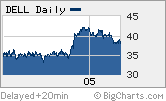 |
| Sell Dell? The stock has taken a hit this year and many insitutional investors think now's the time to buy. |
|
| �* based on estimates for this fiscal year and prices as of 3/6/05 | | �Source:��Thomson/Baseline |
|
|
|
|
|
|
NEW YORK (CNN/Money) � It's steady as she goes at Dell...but that hasn't been enough to satisfy Wall Street.
On Wednesday, the eve of its annual analyst meeting, Dell reaffirmed guidance for its fiscal first quarter, saying that it expects sales and earnings growth of 16 percent.
That looks positively fantastic when compared to the expected sales and earnings increases of just 6 percent for top rival Hewlett-Packard. For IBM, the forecast is for 6 percent sales growth and 12 percent earnings growth.
Still, shares of Dell (Research) rose only slightly Thursday morning and are down about 10 percent year-to-date.
One concern is slowing growth. Big businesses might not spend much on hardware this year because they are waiting for Microsoft's new operating system Longhorn, due out next year, before upgrading old equipment. During the analyst meeting Thursday, Dell CEO Kevin Rollins conceded that demand for PCs and servers was a bit lower than expected.
And even though Dell is the clear leader in the PC industry, some investors may be starting to balk at paying up for a company in a maturing business.
The stock is trading at 24 times earnings estimates for this year, a steep premium to HP (Research), which has a P/E of 14, and IBM (Research), which is valued at 16 times 2005 estimates.
Dude, don't dis Dell
But some think it's a mistake to dismiss Dell.
"The question about Dell is whether this is a commodity business. But this is a company with little debt, tremendous cash flows and a great reputation," said Jon Burnham, manager of the Burnham Fund.
At the analyst meeting, Rollins added that the company hopes to take advantage of the recent turmoil in the industry, alluding to IBM's sale of its PC business to China's Lenovo Group, a new CEO at HP and profit problems at Gateway (Research). "Turbulence represents opportunity for Dell," Rollins said.
Harry Blount, an analyst with Lehman Brothers, said that Dell still could wind up generating strong earnings gains even in a sluggish environment because of growth in notebook computers and services, two areas that are more profitable than standard desktops and servers.
"It's legitimate to think we will see a slowdown in PCs and servers in 2005 but what the Street may be underestimating is Dell's ability to grow earnings through profit margin expansion," Blount said.
Stable, not sexy
Dell's profit margins are already pretty healthy, thanks to its model of selling directly to consumers as opposed to retailers and an overall focus on keeping costs down. Dell posted operating margins of 8.8 percent in its latest quarter and net margins of 5 percent. HP had operating margins of 5.4 percent and net margins of 4.4 percent.
If there's one knock on Dell, it could be that it has remained a company that caters mainly to large corporate customers. Even though it has launched several Dell-branded consumer electronics devices, such as flat-screen TVs and an MP3 player, the company lacks the sex appeal of Apple (Research) and its uber-hot iPod.
But fans of Dell like the company's focus. Growth in the consumer electronics market may be sizzling, they say, but pricing pressures are tough.
"I don't see anything that's unhealthy with Dell's strategy," said Knox Fuqua, manager of the AAM Equity fund, which owns shares of Dell. "The problem with the consumer business is the margin issue. Profits can be a whole lot tighter than with the corporate business."
Others say it's premature to say that Dell won't wind up as a big player in consumer electronics.
"Dell didn't invent the PC. It came very late to the party and is now the leader and it seems to be following the same pattern in consumer electronics," said Thomas Laming, president and chief investment officer of TrendStar Advisors, which owns the stock in the TrendStar American Endeavor fund.
Finally, investors shouldn't forget that there's also the potential for Dell to keep using its large supply of cash and investments (it had $14.1 billion as of the end of January) to boost earnings per share through stock buybacks.
The company has been an aggressive purchaser of its own stock during the past few years. And Dell said Wednesday it would buy back about $2 billion's worth of stock this quarter, up from an earlier prediction of $900 million. When companies buy back stock, it reduces the number of shares outstanding and should increase profits per share.
All in all, the pullback in Dell's stock looks like a good chance to scoop up the stock while it's on sale. Betting against Dell for the long-term has not tended to be a smart move.
"If I sold Dell every time people said to sell it, I wouldn't have made any money in the stock," said Burnham.
For a look at Dell and other computer stocks, click here.
Lehman's Blount does not own shares of the companies mentioned but Lehman Brothers has performed investment banking for HP and IBM.
Sign up to receive the Tech Investor column by e-mail.
Plus, see more tech commentary and get the latest tech news.

|